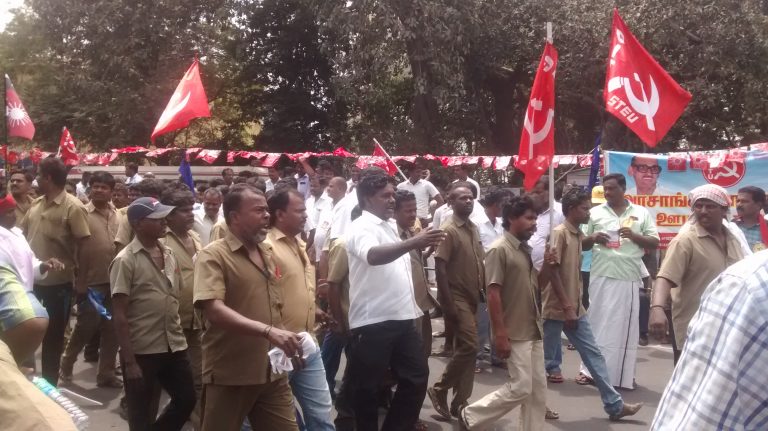Workers in the transport sector across India will be taking part in a country-wide strike called by the All India Coordination Committee of the Road Transport Workers Organizations on August 7 against the Motor Vehicles Amendment Bill 2017. Despite various objections and opposition, this Bill has already been passed in the Lok Sabha (Lower House) of the Indian parliament, and is now pending in the Rajya Sabha (Upper House). The government is seeking to pass it in the current session of Parliament. The main demands of the unions are the withdrawal of the Bill, a minimum wage of Rs. 24,000 for unorganised transport workers and a social security scheme.
The call for the strike has been supported by various central trade unions, such as the Centre for Indian Trade Unions (CITU), All India Trade Union Congress (AITUC), Indian National Trade Union Centre (INTUC), Hind Mazdoor Sabha (HMS) and All India Central Council of Trade Unions (AICCTU), as well as independent state organizations representing road transport undertakings, private bus/mini bus, auto, taxi, light vehicles and goods transport owners and employees, as well as driving school, spare parts shops, automobile workshops and vehicle owners associations.
Transport sector workers have expressed their opposition to the bill ever since it was first proposed in 2014, arguing that its provisions are poised to ease the entry of big private players into the public transport arena, rather than focus on road safety as it claims. Among the key provisions of the bill is the stipulation that only branded company spares are to be used, which would affect small-scale enterprises in the automobile manufacturing sector and dealers in a big way. The bill adds that servicing and repairing works will be done in company service centres only, due to which lakhs of roadside mechanics will lose their livelihoods.
The stated aim of the bill is to improve road safety in India and the amendment also includes hefty penalties for traffic offences. The trade unions argue that instead of addressing the defects in construction of roads, the high speed of individual-owned vehicles flooding the roads, the stress and strain on the drivers, long duty hours, and non-provision of parking and rest facilities, the proposal puts all the onus on drivers and hence, the reduction of accidents will remain a dream. Merely imposing heavy penalties and fines will not reduce accidents; rather, corruption will increase further and this would affect drivers who are mere employees rather than the big companies.
The work being done now by the transport department officials is proposed to be outsourced and the new vehicle registration will be done by dealers themselves. The coordination committee alleges that this will not only threaten the jobs of the transport department employees but is also a serious threat to national security as there will be no accountability. They also argue that proposed amendments to the bill will dilute the powers of the State government and adversely affect State transport corporations, which are instrumental in providing affordable transport to a large section of Indian population.





